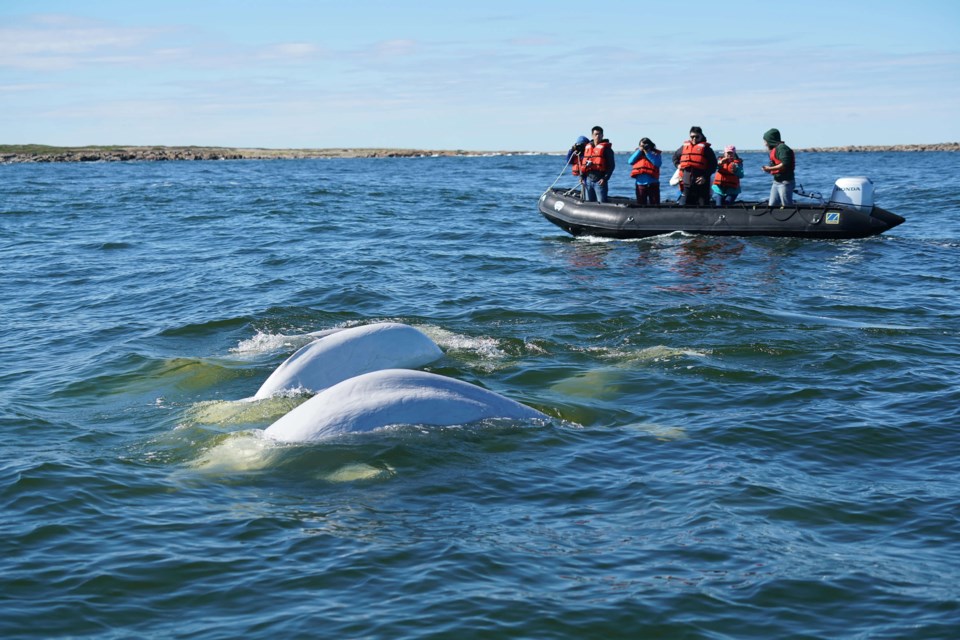Visitors from all over the world -- China, Morocco, Mexico, Europe, including, of course, Canadians and Americans -- had front row seats this month to one of the most extraordinary concerts on our planet. A choir made up of dozens and dozens of gentle giants: beluga whales.
It is one of nature’s greatest gifts and perhaps one of Northern Canada’s best kept secrets.
The belugas are frequently known as “sea canaries” because of the unique and varied sounds they make -- they squeak, chirp, squeal, make clicking sounds, whistle, clang and mew in an aquatic symphony that played out for over an hour during our recent visit.
The sounds the whales made were picked up by a hydrophone that was lowered beneath the surface of the water, just under our boat.
And you can hear them chatter above the water as well.
We are in Churchill, Manitoba, normally known as the polar bear capital of the world, but where an estimated one-third of the world’s belugas spend their summer months in western Hudson Bay. Around 3,000 of them migrate yearly to the estuary of the Churchill River where they provide an unforgettable experience.
And it is the belugas who are proving to be almost as big an attraction in the summer as the polar bears are in winter.
The trips to visit them are much the same in cost: about $7,500 per person for five days, including a two-hour charter flight from Calgary or Winnipeg. Connecting flights from other parts Canada require using scheduled flights to either departure city.
Frontiers North Adventures are pioneering much of the traffic to see the belugas, as well as polar bears in the fall. The beluga whale tour operators, particularly Sea North Tours, are professional and accredited and strictly follow regulations that are in place to keep the belugas safe, including the use of propellor guards to protect the curious marine wildlife. Their boat is custom built for safe beluga watching.
The belugas predominantly inhabit the cold waters of the Arctic and subarctic but are found in the Churchill River estuary during their summer migration where they seek warmer temperatures to give birth and feed. They are very adaptable, preferring diverse habitats ranging from offshore waters surrounded by ice in winter, to shallow coastal waters in summer.
One of their main adaptations to their environment is the lack of a dorsal fin which enables the whales to swim just below sea ice to locate breathing holes and less surface area, minimizing heat loss in frigid waters.
But perhaps, for the visitor, the fact that the seven vertebrae in the belugas neck are not fused, giving them the ability to turn their heads and seemingly nod, provides extraordinary delight to those viewing them.
Primarily though, these distinctive, extremely intelligent and intriguing mammals capture the hearts of many for their inquisitive manner and playful nature.
On this outing, the 200 or so visitors from all over the world were not disappointed, in an unparalleled opportunity, were serenaded by the belugas, here in “our True North”.
“I actually prefer watching the belugas to the polar bears,” veteran guide Tim Cameron told me. “This is one of nature’s best kept secrets… the sounds, the movements the whales make in the water and the proximity to the boats is a phenomenal experience.”
Andrea Rodriguez, from Mexico, said the belugas are such characters and have expressive faces that are very loveable.
“I have been out on the water with orcas, and you can’t get anywhere near as close. This is a much neater experience.”
A group of school children from Park City, Utah, was awed by the belugas.
“It was a wondrous sight to watch and hear. What an educational experience. An experience of a lifetime for them,” said their chaperone/teacher Jamie Madole.
In addition to boats and zodiacs, visitors can also go paddle boarding and kayaking with the whales. One kayaker, Josh Gale, said a beluga actually came alongside him and pushed his kayak for several minutes.
“An awesome, but slightly scary, experience,” he said.
The whales can grow to 15 feet long and weigh well over 1,000 pounds.
They are creating a must-see spectacle for visitors in their natural habitat from mid-July to mid-August. In addition, Frontiers North includes a six-hour expedition onto the tundra in one of its speciality-built Tundra Buggies to view the stunning wildflowers and local wildlife at this time of year. There are also opportunities, if the conditions are favourable, to see the Northern Lights.
Environmentalists are advocating for the creation of a National Marine Conservation area in western Hudson Bay to protect this healthy, abundant ecosystem for future generations. Oceans North says this would reinforce the importance of preserving this upstream and coastal habitat as a gathering place and nursery.
Meanwhile, the belugas will keep playing their aquatic symphony.
Clive Jackson was managing editor of GlobalBC and is now retired and living in Priddis. He has travelled extensively and has his own travel website at Headlinephotography.ca.




